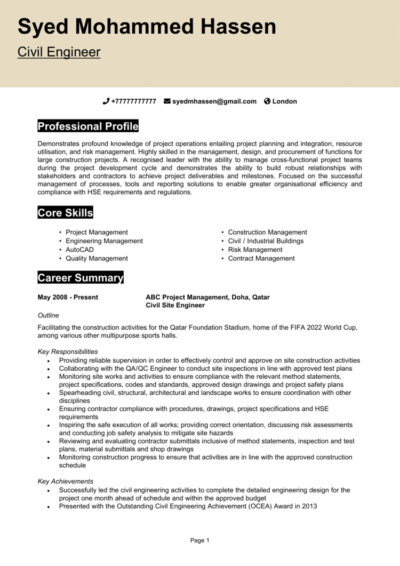From bridges to circuit boards, if it’s designed, built, or fixed, an engineer was behind it. But now it’s time for the toughest challenge yet – making sure your CV is just as structurally sound, and landing you the job.
This guide and its Engineer CV examples will help you show off your engineering expertise, technical skills, and professional achievements – so you can land the role you’re aiming for.
Civil Engineer CV
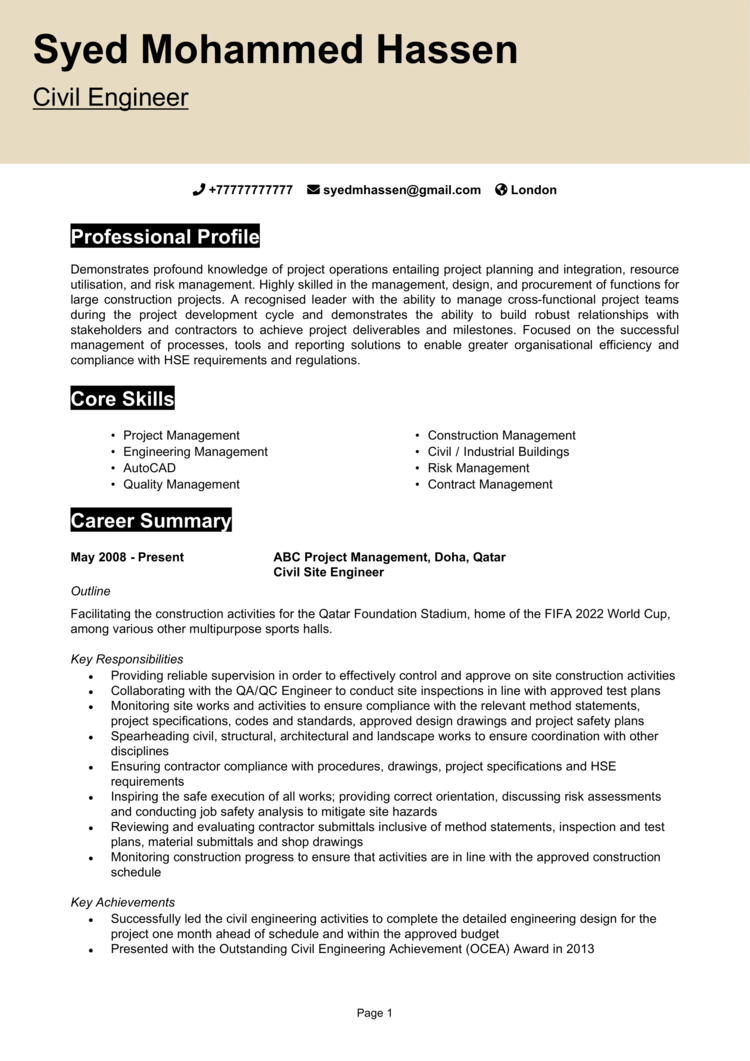
Electrical Engineer CV
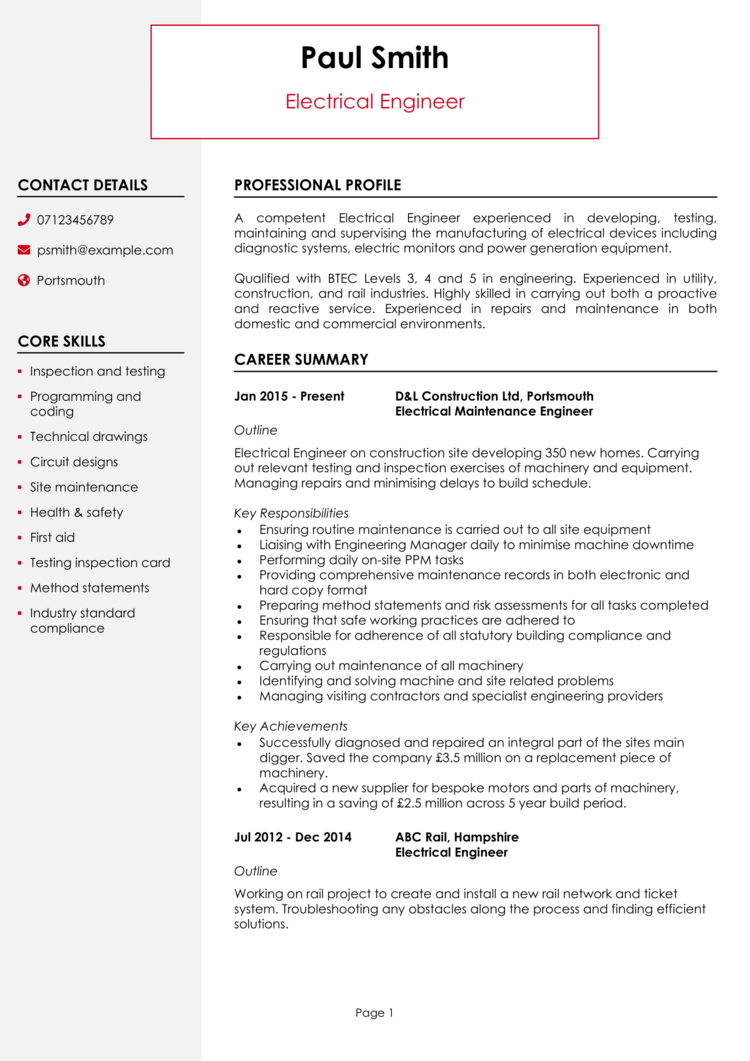
Mechanical Engineer CV
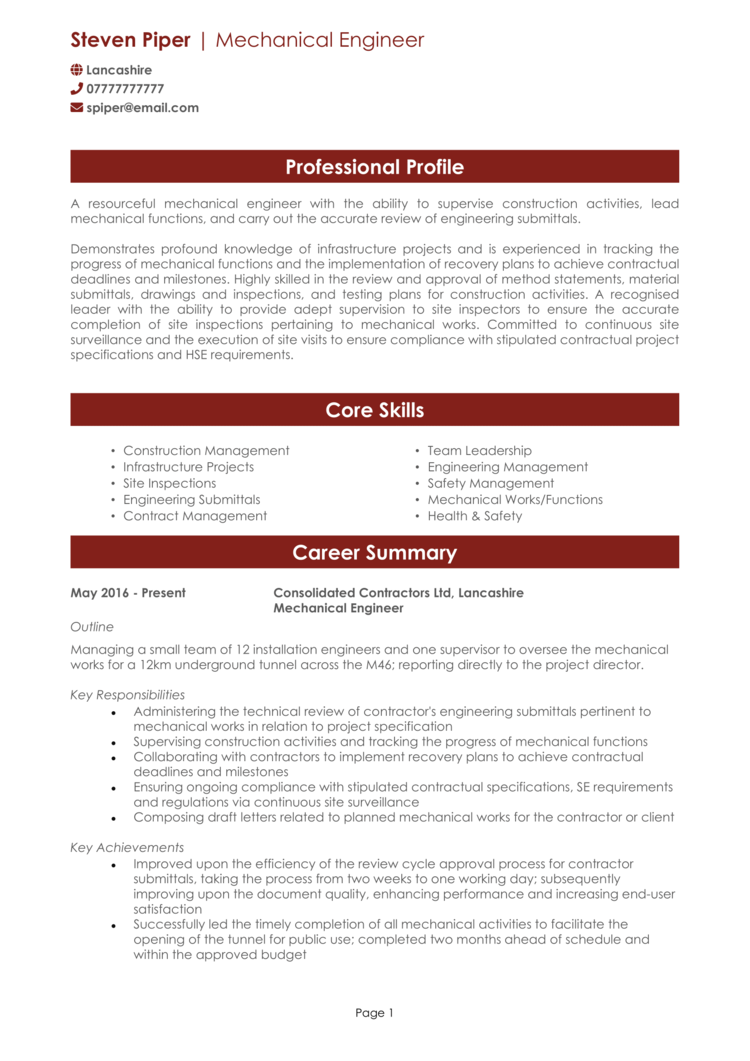
Engineering Student CV
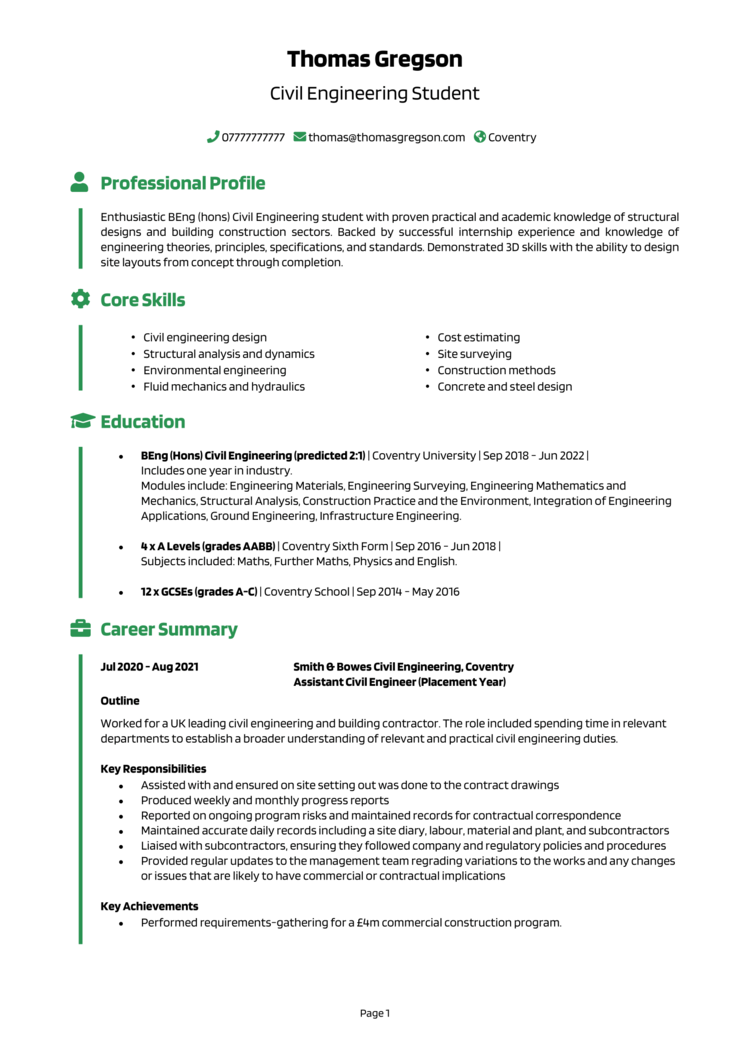
Engineer Director CV
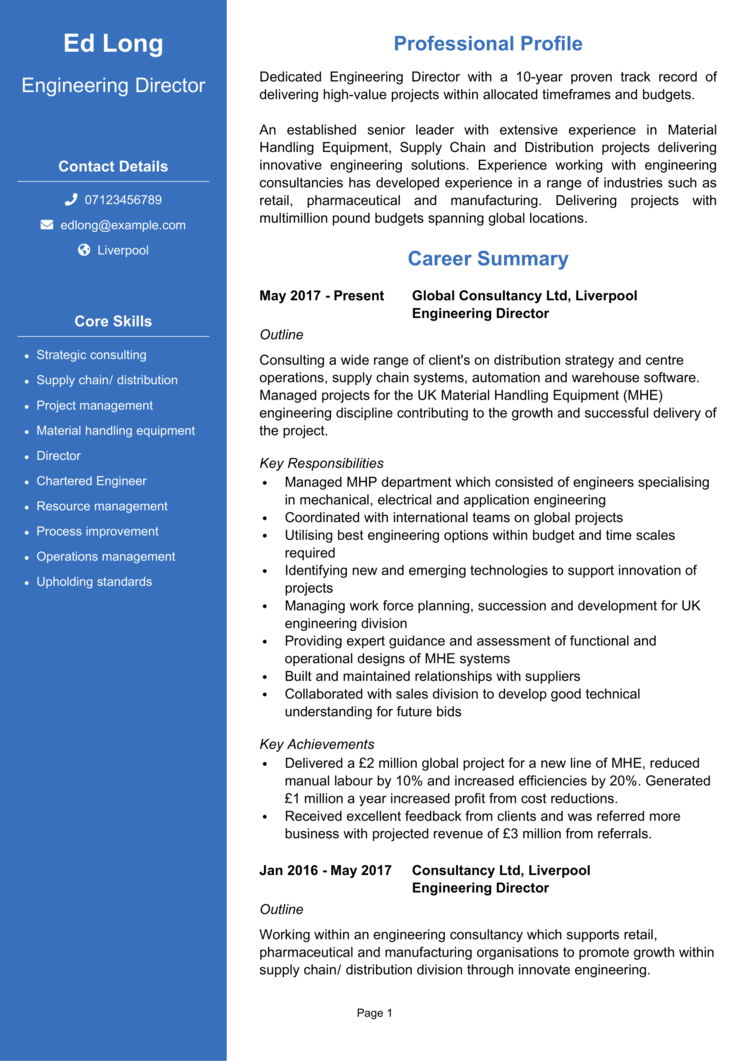
Engineering Consultant CV
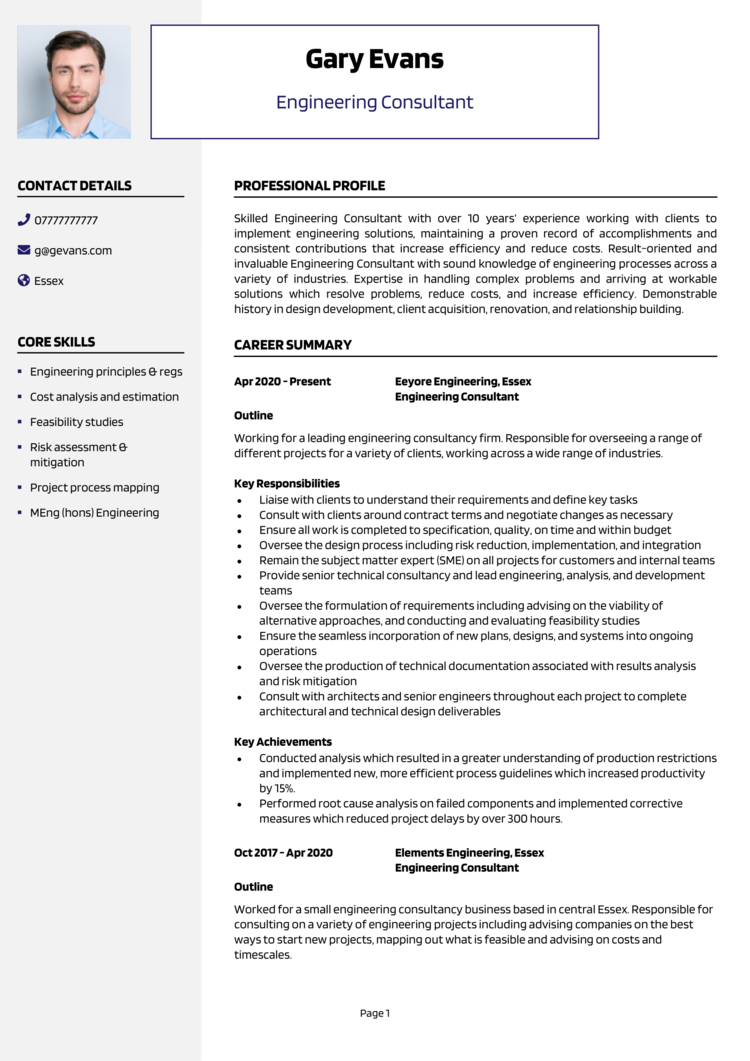
Railway Engineer CV
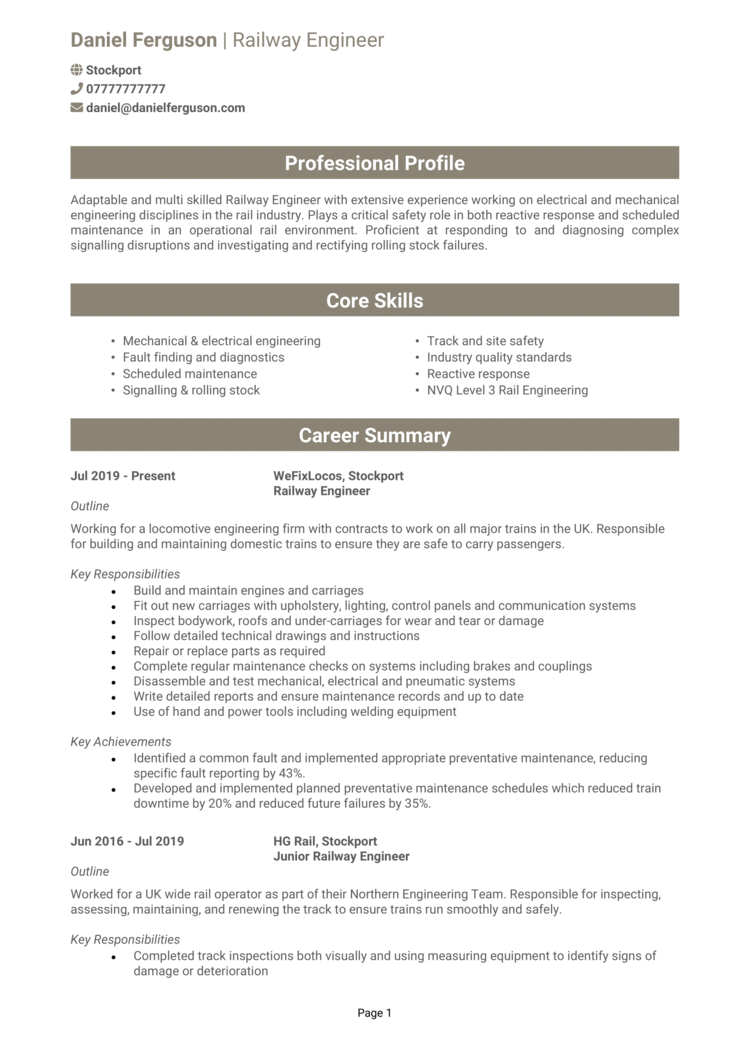
How to write your Engineer CV
Learn how to create your own interview-winning Engineer CV with this simple step-by-step guide.
A great engineering project starts with a solid foundation: writing a CV should be the same. This guide will walk you through how to format your Engineer CV, showcase your technical expertise, and present your experience in a way that ensures recruiters see you as the best engineer for the job.
Think of this guide as your engineering spec sheet – follow the plan, and everything will fit together perfectly.
Structuring your Engineer CV


A well-structured CV makes it easy for hiring managers to find your key qualifications and experience. If they’ve got to reverse-engineer your CV just to find your experience, you’re in trouble: a clear and coherent layout will guide them towards the details you want them to read the most.
Here’s the structure you should follow:
- Name and contact details – Place these personal details, along with a totally optional photo, at the top so employers can get in touch easily.
- Profile – Kick things off with a concise overview of what makes you the ideal candidate for the job.
- Core skills – Briefly highlight those qualities which make you the best candidate, like technical analysis and software proficiency.
- Work experience – List your previous roles in reverse chronological order, with your most recent first, focusing on engineering projects, problem-solving, and efficiency improvements.
- Education – Go through the academic history which underpins your expertise, like relevant qualifications, degrees, and certifications in engineering.
- Additional info – This optional section can include professional memberships, awards, or hobbies that showcase your skill and interest in the industry.
Formatting your Engineer CV


Whether it’s CAD drawings or a CV, precision matters in engineering. A poorly formatted CV is like a miscalculated load-bearing structure – prone to failure. Your format should be free from mistakes to let recruiters easily understand the things that make you such a perfect candidate.
Follow these formatting rules:
- Bullet points – Use these to highlight key skills and achievements quickly and clearly.
- Divide sections – Separate parts of your CV logically so it’s easy to navigate.
- Use a clear and readable font – Stick to professional and clean fonts, and a sensible colour scheme.
- No more than 2 pages – Keep it a concise length to maintain their interest while still covering all the essentials.
Writing an Engineer CV profile


Your CV profile should quickly introduce you as a skilled engineer who brings value to every project. It should show hiring managers that you don’t just follow blueprints – you create them. You’re in a competitive field, so you should convey the value in going with you over someone else.
Engineer CV profile examples
Profile 1
Detail-oriented Engineer with four years of experience in mechanical system design, troubleshooting, and process optimisation. Skilled in CAD software, materials testing, and project management. Proficient in using AutoCAD, SolidWorks, and MATLAB for engineering analysis. Dedicated to improving efficiency and ensuring compliance with industry standards in manufacturing and product development.
Profile 2
Innovative Engineer with over six years of experience in electrical and automation systems, focusing on control panel design, circuit optimisation, and system integration. Skilled in PLC programming, SCADA development, and embedded systems. Proficient in using LabVIEW, EPLAN, and Python for automation and data acquisition. Passionate about driving technological advancements in industrial automation and smart systems.
Profile 3
Experienced Engineer with three years of expertise in civil infrastructure and structural analysis. Adept at designing load-bearing structures, conducting site inspections, and ensuring compliance with safety regulations. Proficient in STAAD.Pro, SAP2000, and Revit for structural modelling and analysis. Committed to delivering innovative engineering solutions that enhance public and private sector projects.
What to include in your Engineer CV profile
Ideally, your profile should include:
- Engineering discipline – Whether mechanical, civil, electrical, or another specialism, make it clear.
- Industry experience – Highlight relevant sectors, such as construction, manufacturing, aerospace, or energy.
- Key technical skills – Mention areas like CAD design, structural analysis, or process optimisation.
- Project achievements – If you’ve improved efficiency, reduced costs, or delivered innovative solutions, showcase the impact.
- Software proficiency – Include relevant engineering tools like AutoCAD, MATLAB, or SolidWorks.
Core skills section


A strong core CV skills section gives hiring managers a quick overview of your expertise in just a short number of bullet points.
Here’s a tip: include the keywords a recruiter is actually looking for when they read applications. Steer clear from generic cliches, and emphasise your practical hard skills.
Top skills for your Engineer CV
- Technical Design and Analysis – Creating and evaluating engineering designs using CAD software and analytical methods.
- Project Management – Planning, executing, and overseeing engineering projects to meet deadlines and budget constraints.
- Problem-Solving and Troubleshooting – Identifying and resolving technical issues in systems, processes, or equipment.
- Mathematical Modelling – Applying advanced calculations and simulations to optimise engineering solutions.
- Materials Science and Selection – Understanding material properties to choose the best options for specific engineering applications.
- Regulatory Compliance – Ensuring designs and projects adhere to industry standards and safety regulations.
- Prototyping and Testing – Developing and evaluating prototypes to refine product functionality and durability.
- System Integration – Combining multiple engineering components to ensure seamless operation and efficiency.
- Data Analysis and Interpretation – Using statistical and computational tools to assess system performance and make informed decisions.
- Collaboration and Cross-Disciplinary Communication – Working with teams across mechanical, electrical, civil, or software disciplines to achieve project goals.
Work experience


It’s not enough to say you “worked on engineering projects” – did they work better, faster, or cheaper because of you? Your work experience should demonstrate how you’ve used your skills to solve problems and contribute to successful projects in the real world.
List your roles in reverse chronological order, ensuring each entry is structured with bullet points. If you’re early in your career, highlight internships, research projects, or hands-on experience gained during university.
How to structure jobs

- Outline – Introduce the company, your role, and the type of engineering work you were involved in.
- Responsibilities – List key tasks, such as designing, testing, or improving engineering systems. Use action words like “developed”, “optimised”, and “analysed”.
- Achievements – Highlight measurable results, such as improved project efficiency, cost savings, or technical innovations.
Example jobs for Engineer
Mechanical Engineer | PrecisionTech
Outline
Designed and optimised mechanical components for industrial machinery, ensuring high performance and durability.
Responsibilities
- Developed 3D models and technical drawings using SolidWorks and AutoCAD.
- Conducted stress analysis and material testing to improve product reliability.
- Collaborated with production teams to streamline assembly processes and reduce waste.
- Implemented predictive maintenance strategies to enhance equipment longevity.
- Ensured compliance with ISO 9001 and other industry regulations in all designs.
Achievements
- XXReduced production costs by 15 percent through material optimisation and process improvements.
- Developed a new mechanical component that improved machine efficiency by 25 percent.
- Received recognition from management for implementing innovative design solutions.
Civil Engineer | UrbanBuild Solutions
Outline
Managed the design and construction of infrastructure projects, ensuring structural integrity and adherence to safety standards.
Responsibilities
- Designed and analysed structural components for bridges, roads, and commercial buildings.
- Conducted site inspections to monitor construction progress and adherence to project specifications.
- Performed load calculations and material selection for optimised structural design.
- Collaborated with contractors and government agencies to ensure regulatory compliance.
- Prepared detailed project reports and provided technical guidance to site engineers.
Achievements
- Successfully led the design of a £5M road construction project, completed ahead of schedule.
- Reduced material waste by 20 percent through efficient project planning.
- Improved project efficiency by implementing an advanced project tracking system.
Electrical Engineer | InnoPower Systems
Outline
Designed and maintained electrical systems for industrial automation and power distribution, ensuring operational efficiency.
Responsibilities
- Developed electrical schematics and circuit designs for automation and control systems.
- Programmed and tested PLCs for process automation in manufacturing plants.
- Conducted power system analysis to optimise energy efficiency and reduce downtime.
- Liaised with cross-functional teams to integrate electrical systems with mechanical components.
- Ensured compliance with IEEE and IEC safety standards in all electrical designs.
Achievements
- Reduced system downtime by 30 percent through predictive maintenance and automation upgrades.
- Developed an energy-saving system that decreased power consumption by 20 percent.
- Recognised for successfully implementing a SCADA system that improved remote monitoring capabilities.
What’s the best way to write an education section?


Engineering requires solid academic foundations, so make sure your qualifications are clearly listed. But as always, practical experience is the priority for recruiters: so keep your education section brief. Junior candidates can afford to expand on certain courses more.
Include degrees in engineering disciplines such as Mechanical, Civil, Electrical, or Software Engineering. If you have additional training in specific tools or certifications, list them here.
Qualifications recruiters look for in Engineers
- Bachelor’s or Master’s Degree in Engineering – Essential for any professional engineering role.
- Chartered Engineer (CEng) or Incorporated Engineer (IEng) Status – Recognised credentials that demonstrate expertise.
- AutoCAD or SolidWorks Certification – Useful for engineers working in design and drafting.
- Project Management Professional (PMP) Certification – Valuable for engineers involved in project planning and execution.
- Six Sigma Certification – Great for engineers working on process improvement and efficiency.


